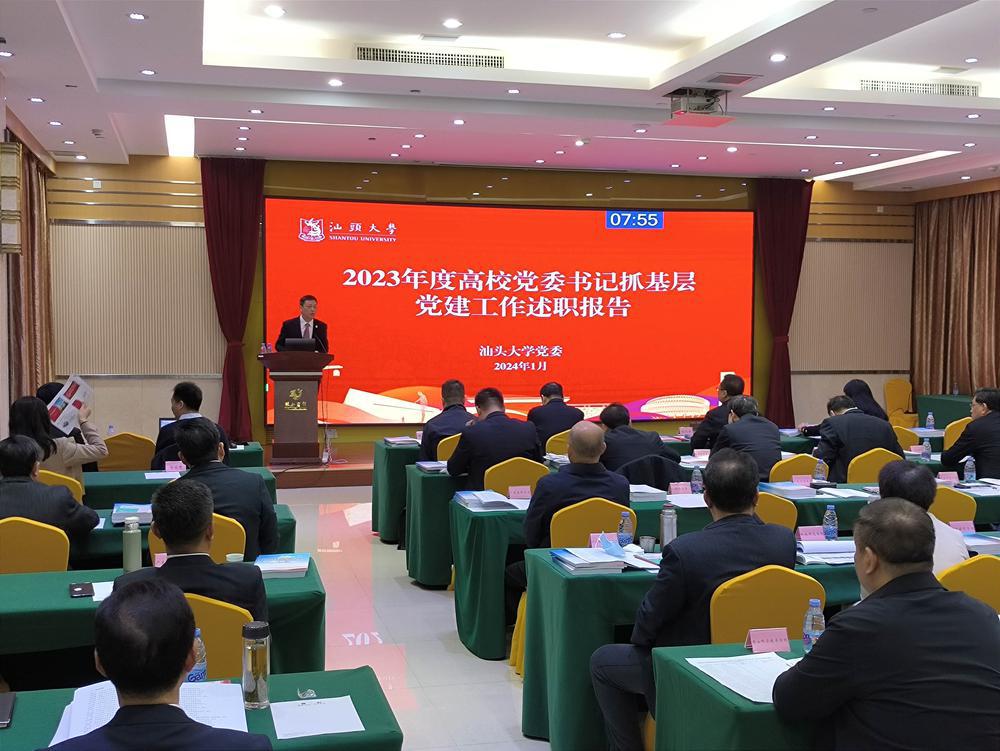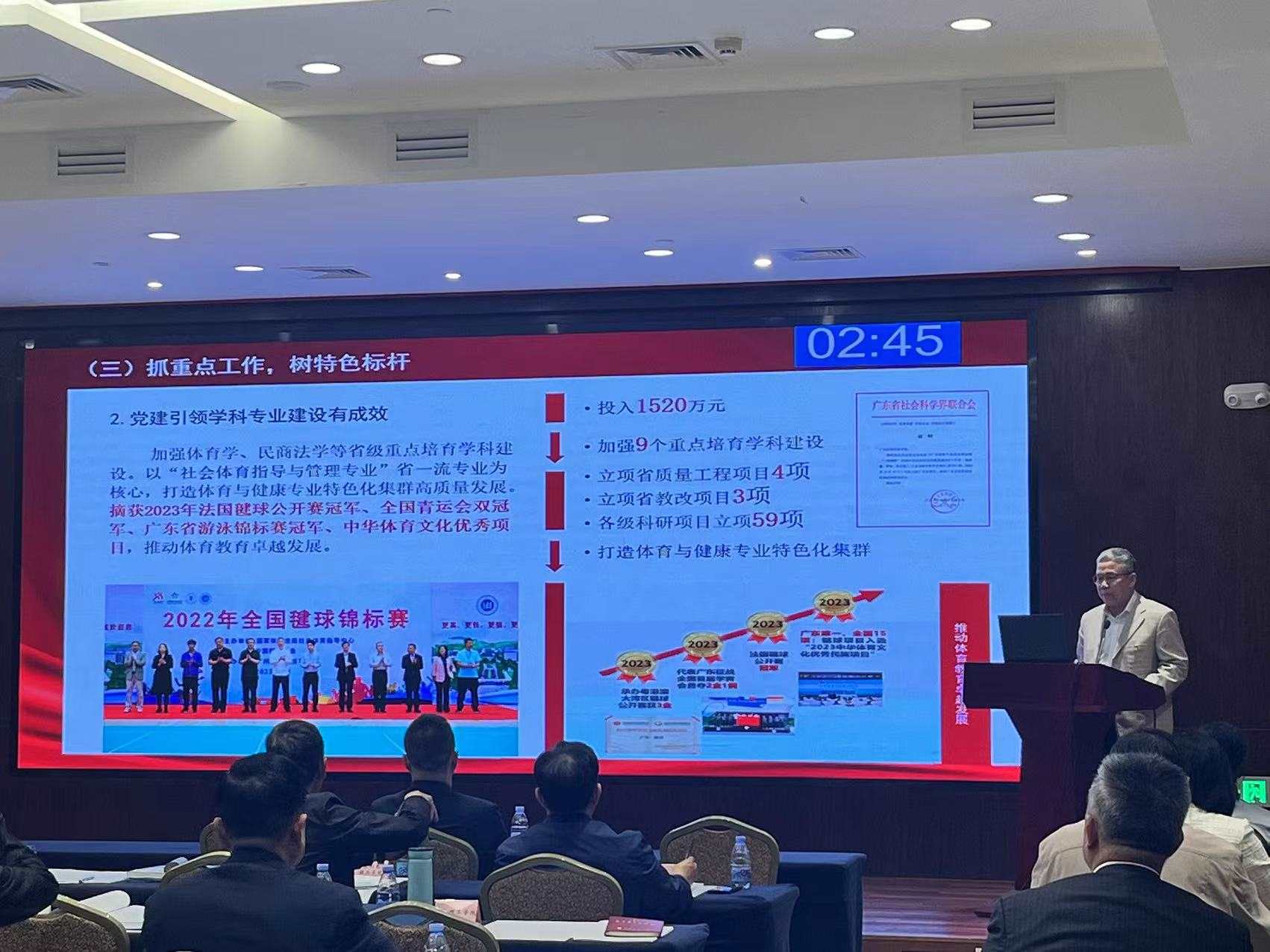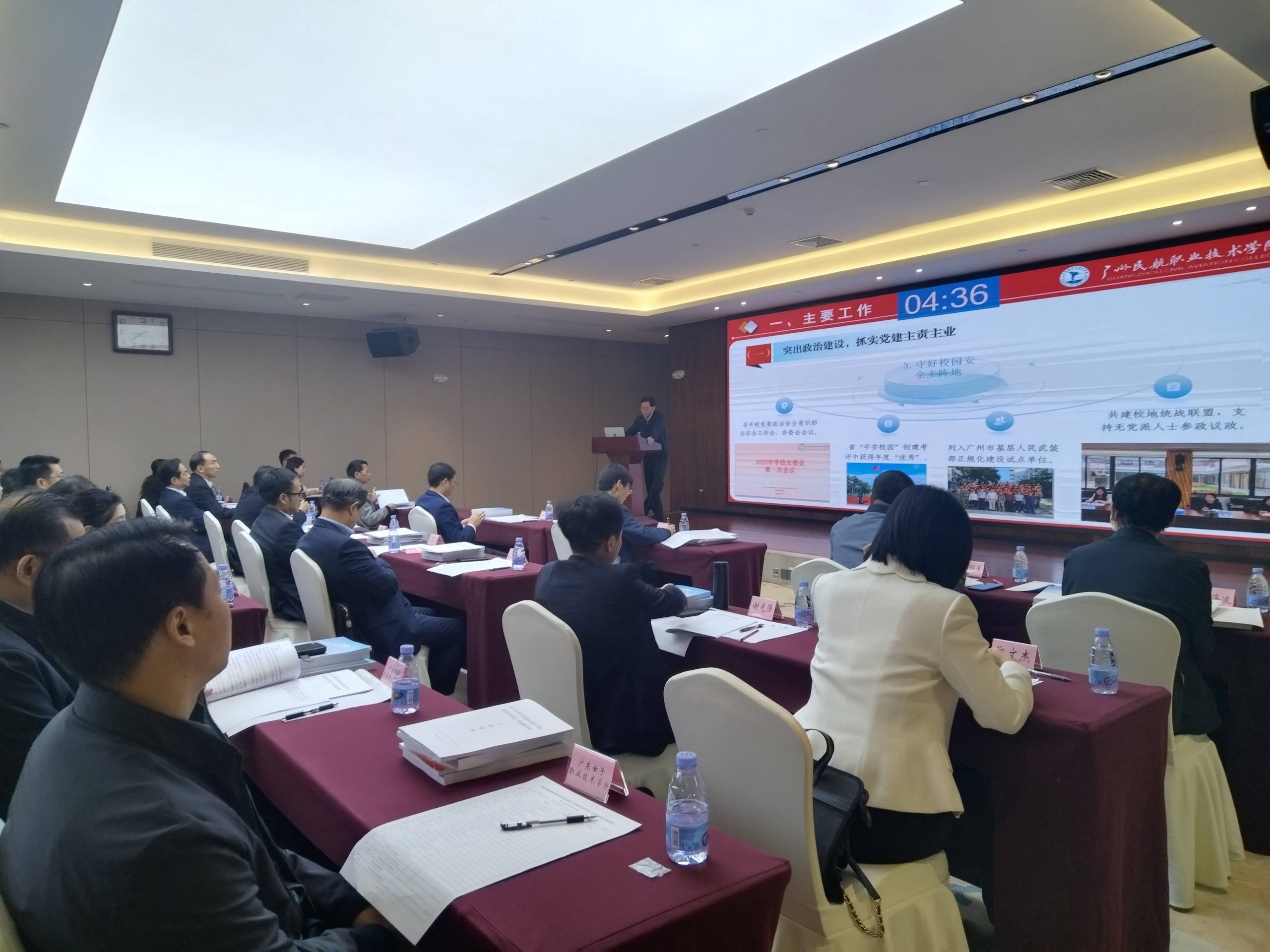Today, the party secretaries of 160 colleges and universities in Guangdong took to the stage one by one to report on their duties. This is what the party building work has done in the past year!
On January 15, the Education Working Committee of the Guangdong Provincial Party Committee held an expanded meeting to listen to the party secretaries of 160 colleges and universities in the province’s 2023 work on grass-roots party building and make comments. The meeting was divided into three groups: public undergraduate colleges and universities, public higher vocational colleges and universities, cooperative education and private colleges and universities. The party secretaries of each college focused on studying and implementing the spirit of the 20th National Congress of the Communist Party of China, in-depth theme education, implementing the specific deployment of the Provincial Party Committee "1310" and the spirit of the national and provincial organization work conferences, implementing the responsibility system for grass-roots party building work, and promoting the high-quality development of party building leading the cause.

At the meeting, the party secretaries or relevant responsible persons of 40 public undergraduate colleges and universities made a specific report on the main work, existing problems, understanding and next steps in the process of promoting grass-roots party building in 2023 by promoting high-quality development with high-quality party building, implementing the specific deployment of the provincial party committee "1310".
In 2023, the party secretaries of various colleges and universities will perform the duties of the "first responsible person", implement the grass-roots party building work, and promote the high-quality development of colleges and universities.
Sun Yat-sen University adheres to the party’s political construction as the guide, and has successively organized activities such as micro-party class selection and broadcasting, "Best Party Day Activities" to enrich the form of party member education, and optimize the setting of party organizations in off-site school campuses (parks). Chen Chunsheng, secretary of the school’s party committee, introduced: "The school held the 14th party congress, leading the high-quality connotation development of the school’s cause with high-quality party building."
Peng Yonghong, Secretary of the Party Committee of Huizhou University, said that the school adheres to the implementation of the three-year action plan for grass-roots party building, improves the "1 + 2 + 10" "big ideological and political" work system, strengthens the construction of cadres, and closely adheres to the words "strict", "real", "break through" and "reform" to strengthen the party’s overall leadership over the school’s work and lead the school’s high-quality development.
The "Hundred Counties, Thousand Towns and Thousand Villages High-Quality Development Project" initiative is an important measure for Guangdong Province to promote the coordinated development of urban and rural areas. In 2023, Guangdong universities will work together to promote the "Double Hundred Action" innovation bureau.
Chen Wenhai, deputy secretary of the Party Committee and president of Jiaying College, introduced that the school took the "Double Hundred Action" as a breakthrough point, organized the teachers and students of the School of Computer Science to overcome difficulties around the needs of Fengshun electroacoustic technology, empowered the construction of green and beautiful ancient trees and red villages with professional advantages in tourism planning and architectural design, mobilized the expert team of affiliated hospitals to help the Second People’s Hospital of Fengshun County, and interpreted the principle of "what the county needs, what the university can" with practice, injecting strong impetus into the high-quality development of the county.
Lin Lan, Secretary of the Party Committee of Guangzhou Academy of Fine Arts, said that the school uses its professional expertise as the engine, gives full play to the demonstration and organizational role of the "Double Hundred Action" Rural Construction Planning University Alliance, and hosts the 2023 "Yuemei Village" style design competition. It has solidly promoted the pairing assistance work with 12 villages in 3 towns of Yangchun, and creatively formed the "Art Design + N" working mode.
In 2023, Guangdong is one of the provinces with the fastest progress in higher education in the country. Zhu Kongjun, Secretary of the Provincial Education Work Committee, Secretary of the Provincial Department of Education, and Director of the Provincial Department of Education, stressed that there are currently more than 2.6 million college students in Guangdong, but there is still room for progress in higher education as a whole. College party secretaries should think about how to insist on doing something and not, focus on national strategic needs, focus on local economic development, focus on improving the ability to serve high-quality development, and "build a peak on the plateau".
Zhang Xichun, Secretary of the Party Committee of South China University of Technology, introduced that the school will further implement the "Double Hundred Action", deepen research and exchange, improve the cooperation mechanism, and accelerate the practical transformation of the scientific and technological achievements and governance advantages of Chinese workers into visible productivity in Heshan and Huilai. By 2027, through summary and condensation, a typical experience that can be replicated and promoted will be formed.
Lu Jinghui, party secretary and president of Guangdong Medical University, said that in 2024, Guangdong Medical University will further "strengthen the foundation, strengthen its advantages, and strengthen its characteristics", gather its resource advantages, consolidate the development of its core competitiveness foundation, and accelerate the creation of "marine and tropical medicine", "health big data and intelligent medicine" and other fields. It will continuously enhance its ability to serve national strategies and social development.

This time, a total of 56 party secretaries of cooperative schools and private universities will report their duties. Cooperative schools are the forefront of education opening up to the outside world. Multivariate subjects, different cultures and different systems intersect here, and the school’s party organization work needs to explore new methods and new paths.
As a cooperative university between the mainland and Hong Kong, Qu Sentinel, party secretary of the Hong Kong University of Science and Technology (Guangzhou), mentioned that the school implements the principal responsibility system under the leadership of the council, and establishes and improves the daily communication and consultation mechanism between the party committee and the school’s administrative management and the joint meeting system under the premise of abiding by this system. The system of "two-way entry and cross-appointment" between party committee members and school administrative management is implemented.
"The goal of the party committee is to create a supportive environment for the successful operation of the partner university." Li Xueshi, party secretary of the Chinese University of Hong Kong (Shenzhen), mentioned that the school has made concerted efforts to implement the specific deployment of the "1310" of the provincial party committee by promoting exchanges and cooperation between Shenzhen and Hong Kong in an all-round way, vigorously introducing high-level talents, and improving the quality of international cooperation and exchanges. Strictly implement the main responsibility of party building.
Mao Yaqing, party secretary of the Beijing Normal University-Hong Kong Baptist University Joint International College, said that the school has continuously strengthened the party’s system construction and ideological work, strengthened the construction of talent teams, deepened the sharing of party building, and strengthened the construction of group organizations.
In 2023, the cooperative universities will place great emphasis on promoting educational and cultural exchanges. Zhu Dijian, party secretary of Beili Moscow University in Shenzhen, mentioned that in April 2023, the school approved the establishment of a Marxist college under the promotion of the party committee. Offer 6 compulsory ideological and political courses, "Four History" compulsory courses and 1 elective course, and go LIVE university’s first Sino-Russian bilingual blog "Talking about" Russia "to carry out basic education counterpart assistance and Guangdong young college students" Million Project "commando action.
Lin Danming, Secretary of the General Party Branch of Guangdong Technion-Israel Institute of Technology, introduced that in order to coordinate superior resources for the "Million Project", the school jointly carried out the "High-quality Development Project of Thousand Towns and Thousand Villages in Hundred Counties" with the People’s Government of Jinping District, Shantou City and the Fujiang Sub-district Office, and provided support and services for regional development through cooperation forms such as "building platforms, building bases, educating talents, cultivating leaders, and strengthening industries".
What to do next? Li Jinping, secretary of the Party Committee of Zhuhai College of Beijing Institute of Technology, mentioned that 2024 is a critical year for Zhuhai College to integrate into the Zhuhai campus. Next, it will adhere to the concept of people-centered, accelerate the all-round development of faculty and staff, and implement the fundamental task of building people through morality and further promote "three-complete education".
"In politics, we need to raise our standing, pay great attention to ideology, be practical in measures, focus on practical results in work, satisfy teachers and students in results, and promote development in goals," said Li Jianchao, party secretary of Guangzhou Southern University. Li Jianchao, the party secretary of Guangzhou Southern University, mentioned that the next step will be to further strengthen the theoretical study of party members and cadres, especially leading cadres. Continuously strengthen the self-construction of leading groups at all levels, further implement the responsibility system of grass-roots party building, consolidate and expand the effectiveness of thematic education.
Feng Xiaoning, Secretary of the Party Committee of Guangzhou Vocational and Technical University of Science and Technology, said that in the next step, the school will continue to enhance the political and organizational functions of grass-roots party organizations, gather strong forces to promote school reform and development, and strive to build a party work team that matches the construction of vocational undergraduate universities.
Shao Yunzhen, a member of the Education Working Committee of the Guangdong Provincial Party Committee, a member of the party group of the Guangdong Provincial Department of Education, and a deputy director, affirmed the party building of various cooperative schools and private universities in his summary comments. He believes that there are characteristics of paying more attention to improving the position, paying more attention to playing a role, paying more attention to strengthening the foundation and solidifying the foundation, paying more attention to serving the overall situation, and paying more attention to optimization and innovation. For the next work, Shao Yunzhen emphasized five requirements, namely, adhering to the correct political direction, consolidating the foundation on the fundamental task of building morality and cultivating people, improving quality and efficiency in strengthening the construction of grass-roots party organizations, uniting forces on high-quality party building leading high-quality development, and highlighting the advantages in serving the Chinese path to modernization Guangdong practice.

A total of 64 public higher vocational colleges were debriefed this time. The "top leaders" of many higher vocational colleges said that in the past year, the school party committees have given full play to the role of party branches as fighting fortresses, and have taken the lead in major projects such as "double high" construction, innovation and strengthening schools, and undergraduate application of vocational education. Carry the beam, deeply empower reform and development.
Du Anguo, Secretary of the Party Committee of Guangdong Vocational College of Light Industry, introduced that Guangdong Light Industry led the establishment of Foshan’s "two highs and four new" industry-education consortium, was selected as the first batch of municipal industry-education consortia by the Ministry of Education, and led the establishment of three industry-education integration communities such as the National Industrial Internet. To build a university industry-education park, the school and the enterprise jointly built 43 productive training platforms for substantive operation, and improved the mechanism of industry-education collaboration and unveiling. There are 4 provincial-level exemplary modern industry colleges and 9 off-campus practice teaching bases. Scientific research has exceeded 35 million yuan, social services have reached nearly 40 million yuan, and technical services and training have reached more than 200 million yuan in 5 years.
Lin Qiasheng, party secretary of Guangzhou Panyu Vocational TechAcademy, said that in recent years, the school’s party committee has taken the initiative to plan and act proactively, closely following the industrial development planning and policy trends of Guangdong Province, Guangzhou City, and the Greater Bay Area, and facing high-end industries and high-end industries. Through professional dynamic adjustment, professional construction is more adaptable to the strategic emerging industry layout. Next, the school’s party committee will take the undergraduate major setting as an opportunity to focus on the development of regional strategic emerging industries to set up new engineering majors. The number of engineering majors and enrollment accounts for about 60%, making professional construction more adaptable to the strategic emerging industry layout.
Zhang Xiaoyan, president of Guangdong Vocational College of Finance and Trade, believes that high-quality party building leads the high-quality development of the school, and the level of school running is accelerated. At present, there are more than 16,000 students in the school, and the scale has increased by nearly 12 times in 4 years. The registration rate ranks among the top in the province, and the implementation rate of graduates ranks first in the province. The total number of Ministry of Education supply and demand docking employment education projects ranks third in the country’s higher vocational colleges.
Party building leads education assistance, and colleges and universities give full play to their professional, disciplinary, and talent advantages, and demonstrate the responsibility of Guangdong colleges and universities in the "Million Project" action of Lianbai County, a hundred schools in Guangdong Province.
"The school invested 1 million yuan to comprehensively promote the’Double Hundred Action ‘and rural revitalization." Zhao Weimin, Secretary of the Party Committee of Guangdong Food and Drug Vocational College, introduced that the school has partnered with Guangyao and Chinese workers to help Huilai and Huaiji counties, and the school has in-depth cooperation, selected deputy high-ranking cadres to be stationed in the county, and promoted 22 "Double Hundred Action" projects such as traditional Chinese medicine cultivation, food medicine and diet, and characteristic agricultural products.
Guangdong Vocational College of Foreign Languages and Arts has established four teams of innovative and entrepreneurial teachers and students to explore the local characteristic culture and advantageous industries in Lianjiang, accurately connect the school resources with the development of villages and towns, and enhance the "soft power" of villages and towns.
"The leadership of the superiors is very powerful, the guidance of Guangdong Light Industry is awesome, and the drive to promote the construction of’double highs’ is very strong." Wang Xiaohui, the party secretary of Shantou Vocational TechAcademy, lamented that under the help and guidance of higher vocational party committees such as Guangdong Light Industry Vocational TechAcademy and Guangdong Industry and Trade Vocational TechAcademy, the party building work of his school has made great progress. "We must increase the pressure and strive to meet the standards of Guangdong Provincial Model Colleges for Party Building Work. Although the current gap is very large, we must also increase the pressure to comprehensively improve the level of party building and better serve Shantou’s modernization."
The grass-roots party building in colleges and universities should be guided by students’ needs, using Marxist theory to quench students’ thirst, relieve students’ confusion, and break the dilemma of the curriculum, so that the "ideological and political vitality" of students’ education is stimulated. Pan Jianyong, Secretary of the Party Committee of Guangdong Administrative Vocational College (Guangdong Youth Vocational College), introduced that the school’s 2023 graduates’ employment destination implementation rate was 95.77%, professional matching rate was 92.45%, and the freshman registration rate was 90.61%, which was 13.58%, 23.76%, and 10.33% higher than that of the integration three years ago.
In the comment session, Feng Wei, deputy director of the Guangdong Provincial Department of Education, summarized the effectiveness of party building in higher vocational colleges in 2023, clarified the problems that need to be solved to promote reform, and put forward new requirements for party building in higher vocational colleges. Evaluated the achievements and weaknesses of each college, and clarified the key to "party building leads vocational education reform".
Text and pictures | Reporter, Sun Wei, Cui Wencan, Wang Moyi, Intern, Huang Xiaohan, Hu Yuxiao, Liang Manxin